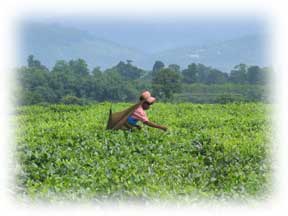|

|
 How
do I brew a perfect cup of tea? How
do I brew a perfect cup of tea?
Good quality water and proper brewing time are essential
for a flavorful cup of tea.
• Start with a preheated pot or cup (simply fill
your teapot or cup with very hot water and let it stand
for a moment).
• Use fresh cold water. In areas with poor tap water,
use bottled or filtered water. Never use water from the
hot water tap. Let the tap water run for a few seconds
until it is quite cold; this ensures that the water is
aerated (full of oxygen) to release the full flavor of
the tea leaves.
• Bring water to a rolling boil. Don't let it boil
too long, as it will boil away the flavor releasing oxygen
and result in a flat tasting cup of tea. Pour boiling
water on tea leaves or tea bag.
• Brew 3 to 5 minutes (for green teas, water should
be a bit cooler and only steep for one to three minutes).
|
 How
much loose tea should I use to make a cup of tea? How
much loose tea should I use to make a cup of tea?
To make an 8 ounce (250 ml) cup of tea, use the following chart
as a guideline. Adjust to taste.
| White
tea |
2
tsp. (20 ml) |
| Green
tea |
1
tsp. (10 ml) |
| Oolong
tea |
2
tsp. (20 ml) |
| Black
tea |
1
tsp. (10 ml) |
| Herbal
"tea" |
Start
with 1 tsp. (1 gm), and increase to desired taste. |
 How
should I store tea? How
should I store tea?
Tea should be stored in an airtight, opaque container
in a cool, dry place. Many tea retailers sell tea in metal
tins that close tightly, which seems optimal. Clear glass
jars are acceptable only if you can keep them in a closed
cupboard away from light. If you reuse containers, avoid
using materials that retain odors, as the tea will pick
them up. The refrigerator is not a good place. The cold
encourages water condensation, which can ruin the tea.
You can freeze tea for long-term storage if you tightly
seal your container and wrap it in plastic. Before you
open a container of frozen tea, let it warm to room temperature
in order to avoid contaminating the tea with condensation.
(You may also want to do this on a dry day.) |
 |
|
 Can
I become addicted to tea? Can
I become addicted to tea?
Addiction to tea is less common than addiction to coffee,
because tea has less caffeine than coffee. But if you
drink enough tea on a regular basis, you can become addicted.
The
most reliable sign that you are addicted to tea is a recurring
headache that seems to have no cause and can be relieved
by drinking tea or another caffeinated beverage. If you
are worried about addiction, the best thing to do is to
cut down gradually on the amount of caffeine you consume. |
|
|
 Can
consumption of Green tea count in one's daily overall
water intake? Can
consumption of Green tea count in one's daily overall
water intake?
Yes, Green tea can be considered in a water intake count
because it basically replaces water one for one. In
comparison, coffee, which has a diuretic effect, provides
a negative overall water intake.
|
 How
much caffeine is there in tea? How
much caffeine is there in tea?
Caffeine content in tea is negligible, when compared with
most carbonated beverages, coffee etc. The human body
requires a certain amount of caffeine and research indicates
that upto 10 - 12 cups of tea daily, will not have any
detrimental effect on the body. The species or the variety
of the tea plant determines content of caffeine in tea,
as it is a genetic feature. However the distribution of
caffeine in the plant depends on the part of the plant
it is derived from.
For
example:
Bud 4.70 %
First leaf 4.20 %
Second Leaf 3.50 %
Third Leaf 2.90 %
Upper stem 2.50 %
Lower stem 1.40 %
Caffeine is one of the three Methylxanthines in tea and
represents the bulk of this component. As caffeine is
a water-soluble compound approximately 80% of caffeine
is extracted during the brewing process. Caffeine content
in brewed tea varies depending upon the blend, the brewing
time and the brewing method. Research has revealed that
a 170- ml (6-oz) serving of tea contains, on average 34
mg of caffeine in comparison to 99 mg of caffeine in a
170 ml serving of brewed coffee and 37mg in 56g of a dark
chocolate bar. |
|
|
